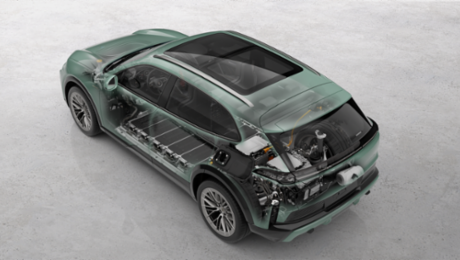It was just the third week of Peter W. Schutz’s stint as the Chairman of the Executive Board of Porsche AG in 1981 when he rescinded the decision that had been made to discontinue the 911. Two years after this commitment to the 911, Porsche engineers built him this 911 Carrera Cabriolet Turbo-look in Silver Rose Metallic. Even before the 911 Carrera was offered with the Turbo-look in the autumn of 1983, the German-American executive had had the chance to drive the pre-production model with its six-cylinder boxer and 170 kW (231 PS). The 3.2-litre engine was first utilised with the coming of the 1984 model year. The 1,210 kg 911 adopted the wide body and spoiler from the 911 Turbo, as well as the suspension and the four-piston fixed-calliper brakes. The body of the Cabriolet was also additionally reinforced to enable perfect power transmission from the Turbo chassis. The rear spoiler could be deleted on request. The extensive special equipment reflected the pre-production status of the CEO’s car: leather sports seats, Cassis leather door handles and storage compartments, 16-inch wheels matching the exterior colour. Porsche owes a debt of gratitude to Schutz not only for retaining the iconic 911 sports car, but also for the successful launch of the 911 Cabriolet on the US market. With this beating heart of the brand, Porsche continues to write history today.
Related Content
Consumption data
- 911 Carrera 4 GTS (WLTP)*: Fuel consumption combined: 10.9 – 10.3 l/100 km; CO₂ emissions combined: 246 – 234 g/km; CO₂ class: G
- 911 Carrera Cabriolet (Predecessor model)
- 911 Turbo S (WLTP)*: Fuel consumption combined: 11.8 – 11.6 l/100 km; CO₂ emissions combined: 266 – 262 g/km; CO₂ class: G
- Cayenne Electric (WLTP)*: Electrical consumption combined: 21.9 – 19.7 kWh/100 km; CO₂ emissions combined: 0 g/km; CO₂ class: A
- Cayenne Turbo Electric (WLTP)*: Electrical consumption combined: 22.4 – 20.4 kWh/100 km; CO₂ emissions combined: 0 g/km; CO₂ class: A
- Macan GTS (WLTP)*: Electrical consumption combined: 20.6 – 18.5 kWh/100 km; CO₂ emissions combined: 0 g/km; CO₂ class: A

